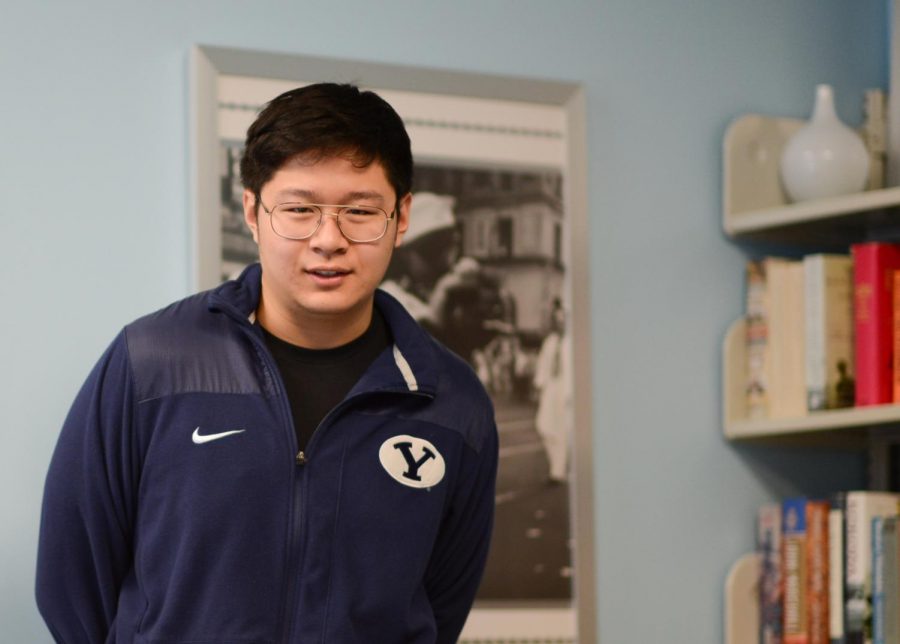Humans of Harker: Matthew Lee finds meaning in contradiction
“I feel like sometimes at Harker, we students have this urge to control everything in our lives,” Matthew Lee (12) said. “Like if you don’t get an A on that test, it’s because you didn’t work hard enough, or if you don’t get into this school, it’s because you didn’t work hard enough, or if you don’t get into that school, it’s because you didn’t do enough. But sometimes that’s just not true. Sometimes things are out of your control.”
November 7, 2017
Matthew Lee (12) speaks softly, but his words carry weight. Whether delivering a wry comment during Modern International Affairs or writing for his Near research paper, he phrases his sentences with care.
“Basically, all words are meant to be said aloud,” he said. “That’s the nature of diction; that’s the nature of language. For me, writing is a very oral process. When I write, it’s not so much like, ‘Oh, you have these ideas that you need to get there,’ it’s more of like, ‘How can I say something that sounds good, how can I get something with that specific flow?’”
Unlike many students who took APUSH simply for the AP, Matthew genuinely enjoys history. He has spent the last sixth months immersing himself in labor unions of the 1930s for his Near research, an ongoing effort that culminates in a thesis-driven paper.
“I think [his topic is] fantastic,” his advisor Julie Wheeler said. “I think it’s absolutely up his alley because he has a passion for social justice, and it certainly comes out in different ways. He is always looking for a way for the little guy to fight the big corporate power.”
Matthew’s intellectual character belies his dry, often irreverent sense of humor.
“He’s not outright funny, but a lot of the comments he makes in class still manage to make everyone laugh,” Melissa Kwan (12) said.
In advisory, he has a reputation for both his subtle humor and his charisma. He incorporates his mellow attitude into his academics.
“Nothing is as serious as they make it seem, especially within the walls of the classroom,” he said. “Nothing really matters, you know what I mean? You might be talking about serious history, but at the same time, your ability to make light of something and speak in a humorous way is also important, because now, if you’re speaking about something that’s hurtful or powerful, you’re de-powering it a little bit.”
Indeed, Matthew’s love of history extends beyond purely academic motives. However, the Near scholarship requires more than simply passion—it takes ambition to handle the combined workload of regular schoolwork and research.
“You wouldn’t even know that he was doing those things if he didn’t tell you because he presents such a calm [attitude],” his friend Isabella Spradlin (12) said. “I don’t know, it’s just part of his personality, where he has so many things going on but he keeps them all under control.”
Matthew credits his calm nature to his concussion from football in sophomore year.
“It kind of changed my view on the world,” Matthew said. “For one, it kind of forced me to stop playing football out of medical concerns, but you know, it kind of made me realize that there are actual consequences to your actions.”
This pivot in his philosophy allowed him to step back and re-examine his attitude towards success.
“I feel like sometimes at Harker, we students have this urge to control everything in our lives,” Matthew said. “Like, if you don’t get an A on that test, it’s because you didn’t work hard enough, or if you don’t get into that school, it’s because you didn’t work hard enough, or if you don’t get into that school, it’s because you didn’t do enough. But sometimes that’s just not true. Sometimes things are out of your control.”
This ideology characterizes his composed approach to political science.
“I know it’s kind of strange for a person with my philosophy, like ‘Let things be,’ to be a political science major, but I think that’s kind of key to the whole process in that you’ve just got to let things develop in a little bit,” Matthew said. “Sometimes [politicians] try to manage things too tightly or try to take control too much when [they] should step back. Just look at the whole picture, see what’s going on first.”


















![“[Building nerf blasters] became this outlet of creativity for me that hasn't been matched by anything else. The process [of] making a build complete to your desire is such a painstakingly difficult process, but I've had to learn from [the skills needed from] soldering to proper painting. There's so many different options for everything, if you think about it, it exists. The best part is [that] if it doesn't exist, you can build it yourself," Ishaan Parate said.](https://harkeraquila.com/wp-content/uploads/2022/08/DSC_8149-900x604.jpg)




![“When I came into high school, I was ready to be a follower. But DECA was a game changer for me. It helped me overcome my fear of public speaking, and it's played such a major role in who I've become today. To be able to successfully lead a chapter of 150 students, an officer team and be one of the upperclassmen I once really admired is something I'm [really] proud of,” Anvitha Tummala ('21) said.](https://harkeraquila.com/wp-content/uploads/2021/07/Screen-Shot-2021-07-25-at-9.50.05-AM-900x594.png)







![“I think getting up in the morning and having a sense of purpose [is exciting]. I think without a certain amount of drive, life is kind of obsolete and mundane, and I think having that every single day is what makes each day unique and kind of makes life exciting,” Neymika Jain (12) said.](https://harkeraquila.com/wp-content/uploads/2017/06/Screen-Shot-2017-06-03-at-4.54.16-PM.png)








![“My slogan is ‘slow feet, don’t eat, and I’m hungry.’ You need to run fast to get where you are–you aren't going to get those championships if you aren't fast,” Angel Cervantes (12) said. “I want to do well in school on my tests and in track and win championships for my team. I live by that, [and] I can do that anywhere: in the classroom or on the field.”](https://harkeraquila.com/wp-content/uploads/2018/06/DSC5146-900x601.jpg)
![“[Volleyball has] taught me how to fall correctly, and another thing it taught is that you don’t have to be the best at something to be good at it. If you just hit the ball in a smart way, then it still scores points and you’re good at it. You could be a background player and still make a much bigger impact on the team than you would think,” Anya Gert (’20) said.](https://harkeraquila.com/wp-content/uploads/2020/06/AnnaGert_JinTuan_HoHPhotoEdited-600x900.jpeg)

![“I'm not nearly there yet, but [my confidence has] definitely been getting better since I was pretty shy and timid coming into Harker my freshman year. I know that there's a lot of people that are really confident in what they do, and I really admire them. Everyone's so driven and that has really pushed me to kind of try to find my own place in high school and be more confident,” Alyssa Huang (’20) said.](https://harkeraquila.com/wp-content/uploads/2020/06/AlyssaHuang_EmilyChen_HoHPhoto-900x749.jpeg)











